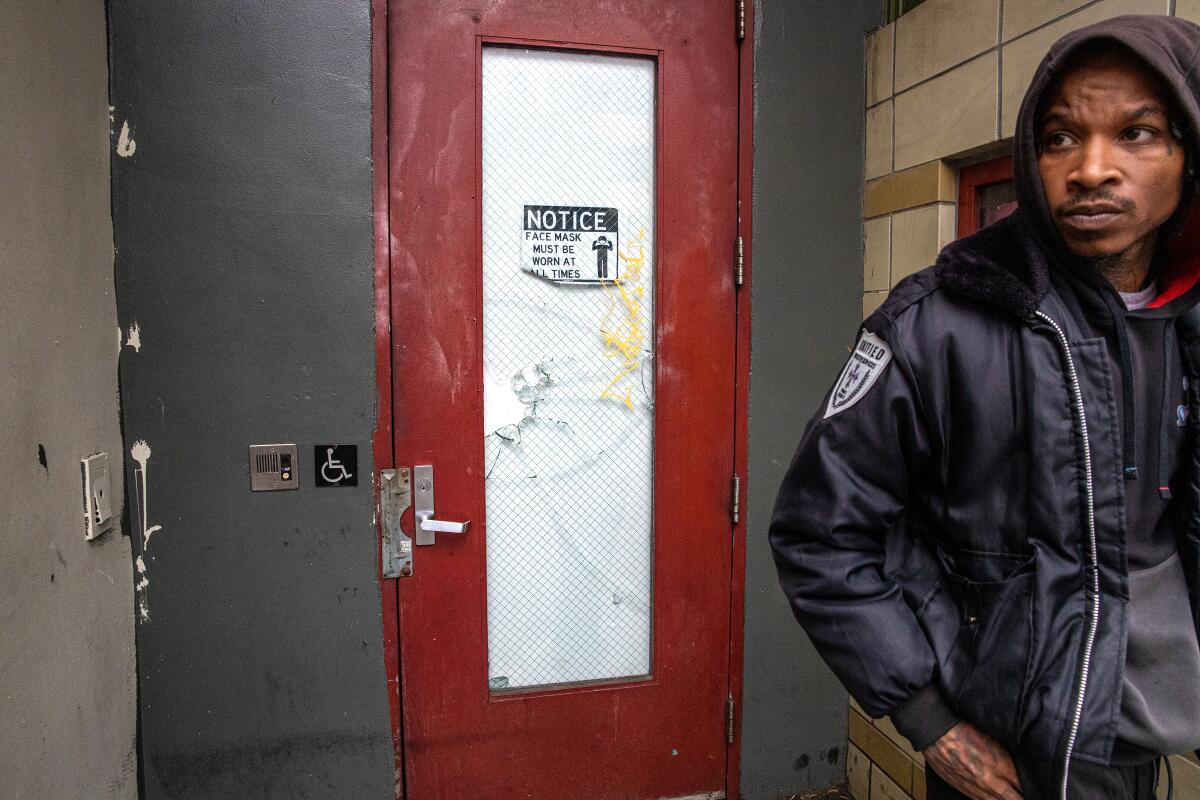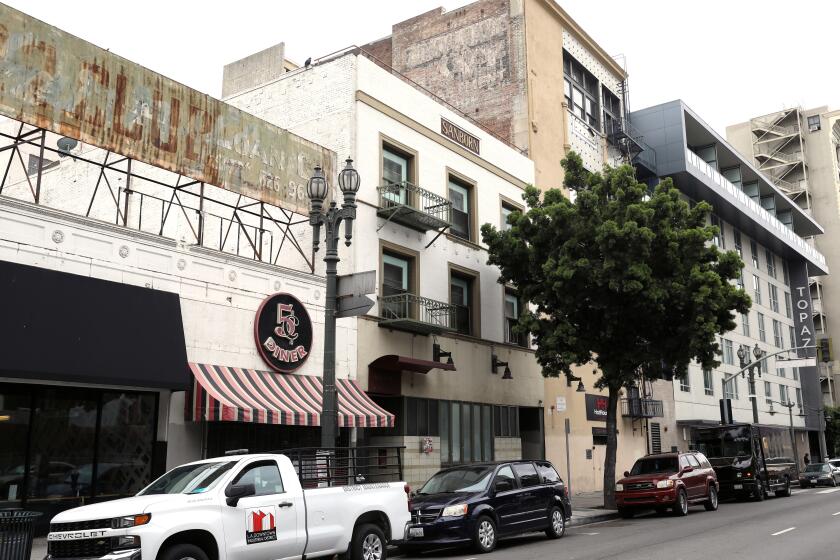Skid Row receiver resigns, prolonging formerly homeless tenants’ turmoil

- Share via
Mark Adams, the receiver overseeing 1,500 Skid Row tenants, submitted his resignation Thursday, ending a tumultuous three-month tenure that failed to stabilize the neighborhood’s largest portfolio of homeless housing while saddling the properties with millions of dollars in additional debt.
Adams resigned at the request of Los Angeles Superior Court Judge Mitchell L. Beckloff near the end of a two-hour hearing, with Beckloff deciding that disputes between Adams and city officials were overwhelming the enormous task of managing 29 properties owned by the nonprofit landlord Skid Row Housing Trust.
Mayor Karen Bass and City Atty. Hydee Feldstein Soto had recommended Adams to manage the trust’s portfolio.
Feldstein Soto heralded Adams, one of the most experienced receivers in the state, as singularly qualified to stabilize the properties and finance repairs so that other affordable housing providers could take them over.
But she admitted that amid the urgency of the trust’s problems, her office did not fully vet his resume. Feldstein Soto and other city leaders said they’d lost confidence in Adams as troubles overseeing the properties escalated over the last month.
“It seems to me that maybe a fresh start is the way to go,” Beckloff said.
Mark Adams is overseeing the welfare of 1,500 tenants in Skid Row. In prior cases involving Adams, tenants faced the risk of eviction and property owners lost their houses.
Beckloff’s hands were tied in part by a City Council decision this week to provide $10 million in new financing only on the condition that Adams be ousted. With Adams’ receivership essentially out of money due to weeks of squabbling over raising funds, the judge determined the city’s plan was the most responsible way to continue paying for needed upgrades and repairs.
City officials hope that the financing will cover unpaid security and other bills Adams has racked up while providing Kevin Singer, the replacement receiver Beckloff approved Thursday, with enough dollars to manage the trust’s properties for at least four more months.
Adams’ tenure has prolonged the turmoil facing the trust’s formerly homeless tenants, who have lived through years of mismanagement and financial disarray while conditions in the buildings steadily worsened. In April, with the trust unable to pay its bills and residents reporting absent security and property management, broken doors, windows and plumbing, and widespread trespassing and drug abuse, Beckloff appointed Adams at Bass’ and Feldstein Soto’s request.
Soon after, a Times report detailed prior cases under Adams’ receivership in which property owners lost their homes, tenants were left at risk of eviction and he overbilled by six-figure amounts.
The city’s problems with Adams first emerged at a court hearing last month. He had borrowed $1.3 million for trust operations and upgrades at 15% interest, which the city said violated a pledge to secure loans only with interest rates lower than 10%.
The next week, the property management firm Adams hired issued 451 eviction notices to tenants who did not pay rent in May. One tenant was told he owed $56, and many others had been exempted from payment because of their units’ deplorable conditions. Feldstein Soto deemed all the notices illegal under city law.
Adams has said the notices were sent without his knowledge, and he rescinded them in letters to tenants.
Since then, city officials have complained that Adams does not provide them with detailed financial information and that repairs have been slow or nonexistent. The number of properties with malfunctioning fire and safety equipment has more than doubled since Adams took over the portfolio, necessitating costly 24/7 security guards, Feldstein Soto told a council committee this week.
Los Angeles city officials say they have a selected a replacement for Mark Adams to take over 29 depressed buildings operated by the defunct Skid Row Housing Trust. The city would have to petition a court to make the change.
Adams pushed back on the city’s claim that fire safety has deteriorated under his tenure, saying that almost all the buildings had problems before he was appointed.
In court papers filed this week, he said city officials were scapegoating him for their failures in allowing the trust’s portfolio to degrade and intentionally starving him of cash. The city’s conditioning financial support on his replacement, he said, was akin to holding trust residents hostage while critical security services and emergency repairs went unfunded.
“Candidly, the City’s actions may end up costing lives,” Adams wrote.
Initially, Adams called on Beckloff to order the city to provide him with the $10 million in financing. But on the eve of Thursday’s hearing, Adams filed a declaration saying he had reached terms with Avatar Financial Group, a Seattle-based private real estate lender, on a $12-million loan at a 15% interest rate with an additional $800,000 upfront fee.
In court Thursday, Adams continued to point to lack of funding as the primary issue facing the receivership and said he was sure he could finish the job if he had access to the money.
“To say that the lack of funds is a problem is an understatement,” Adams said. “Because it is the problem.”
Beckloff seemed to agree with Adams, repeating praise he had offered at previous hearings that Adams was well qualified for the role. The judge also stated that he had no problem with Adams’ work and hadn’t found any wrongdoing.
Managing the trust’s properties was such a tall order that Beckloff said he wasn’t sure anyone could be handling it better.
But the judge determined that the city’s financing scheme, which carries an interest rate of up to 3%, was the best path forward.
“It’s become a situation where I have the city in one corner and the receiver in another and I have a lot of people around the ring,” Beckloff said. “But at the heart of it are 1,500 people who are at risk of becoming unhoused.”
The Skid Row Housing Trust was a model for nonprofits housing homeless people in Los Angeles. Behind the scenes, it was imploding — leaving tenants in squalor.
How much it will cost to repair the trust’s portfolio and who will be on the hook for the bills remain open questions.
Receiverships typically pay for repairs and the receiver’s fees by tapping properties’ equity or using proceeds from a property sale or increased rents. But the trust is on the brink of insolvency, federal and local restrictions prevent tenants’ rents from ballooning, and, amid a homelessness crisis, city leaders are desperate to preserve low-cost housing.
The $10-million loan comes from a city affordable housing program. City leaders told council members this week that they ultimately expected to be repaid as properties were spun off to other entities, but that city and other public subsidies would probably have to cover at least some of the debt.
City officials and Singer, who appeared virtually in court Thursday, developed the new $10-million budget by projecting that more than half of the trust’s affordable housing complexes — the newer and more valuable properties — would be transferred to other nonprofit housing providers over the next few months. Already, Beckloff has approved the exit of six such buildings to PATH Ventures and another to LA Family Housing.
That would leave a dozen of the trust’s residential hotels, many a century old, and its other most dilapidated buildings remaining under the receivership.
“We’re most likely going to have to go back to City Council and request some additional funding after we’ve shown that we’ve made great accomplishments,” Singer said.
One major variable, city leaders said, remains unknown: what Adams’ tenure will cost. Adams had assigned 18 employees with hourly rates ranging from $151 to $465 for himself.
In court filings, Adams said that fees for his company, California Receivership Group, totaled $329,000 for April and May — not counting what is owed to the outside law firm, property management, security and other contractors he’s hired. City lawyers said in court Thursday they believed the total in outstanding bills was north of $3 million.
Feldstein Soto, who was not in court Thursday, has sought to assure council members that Singer will do a better job than Adams. At a council committee hearing this week, she cited a more thorough vetting of the new receiver’s nearly 500-case resume, his work in complex matters in San Francisco and his willingness to provide detailed information to the city about his progress.
“It’s very difficult to come and admit a mistake,” Feldstein Soto said at the hearing. “But I do think that part of our jobs is that if there’s a mistake, to correct it.”
More to Read
Sign up for Essential California
The most important California stories and recommendations in your inbox every morning.
You may occasionally receive promotional content from the Los Angeles Times.











